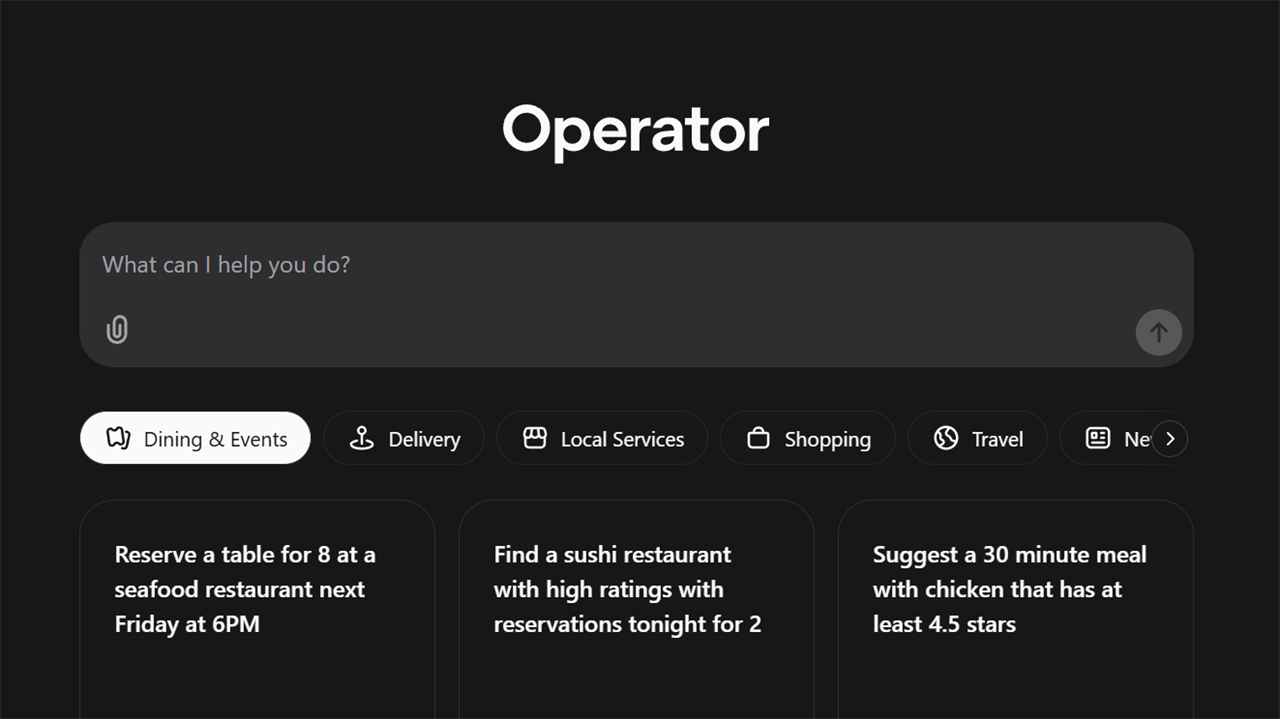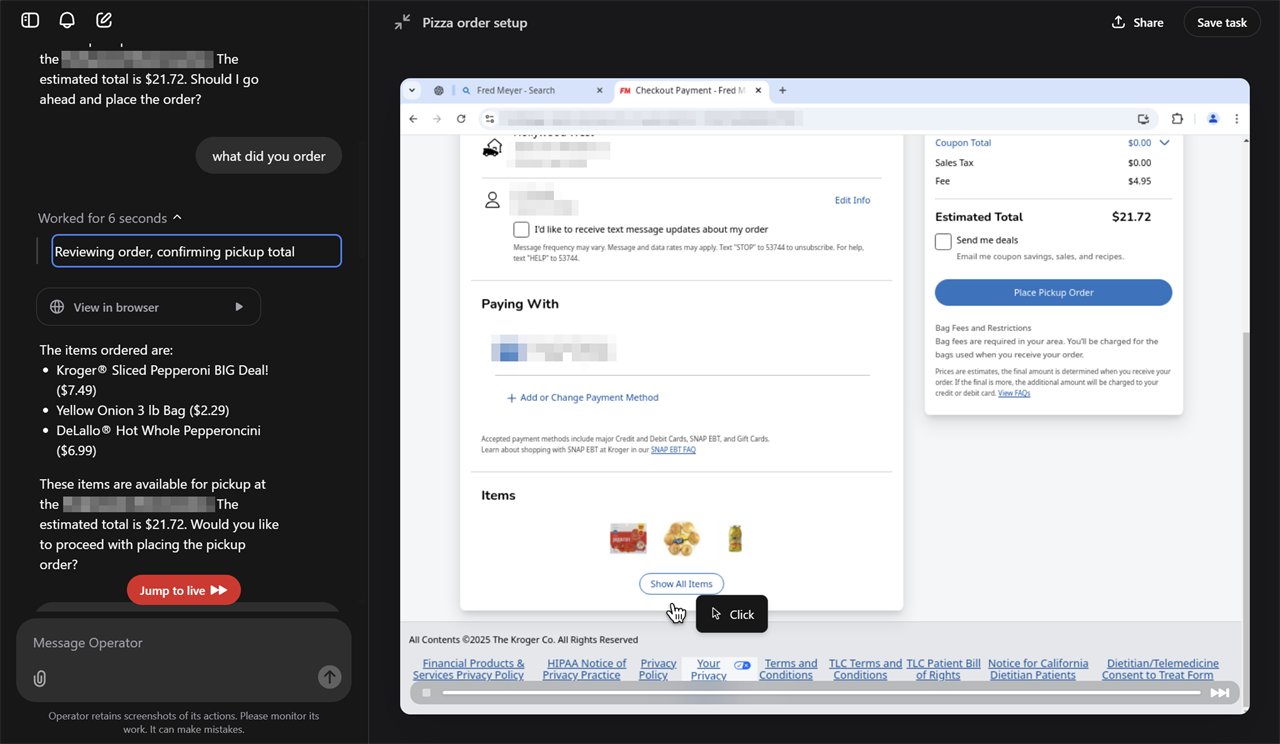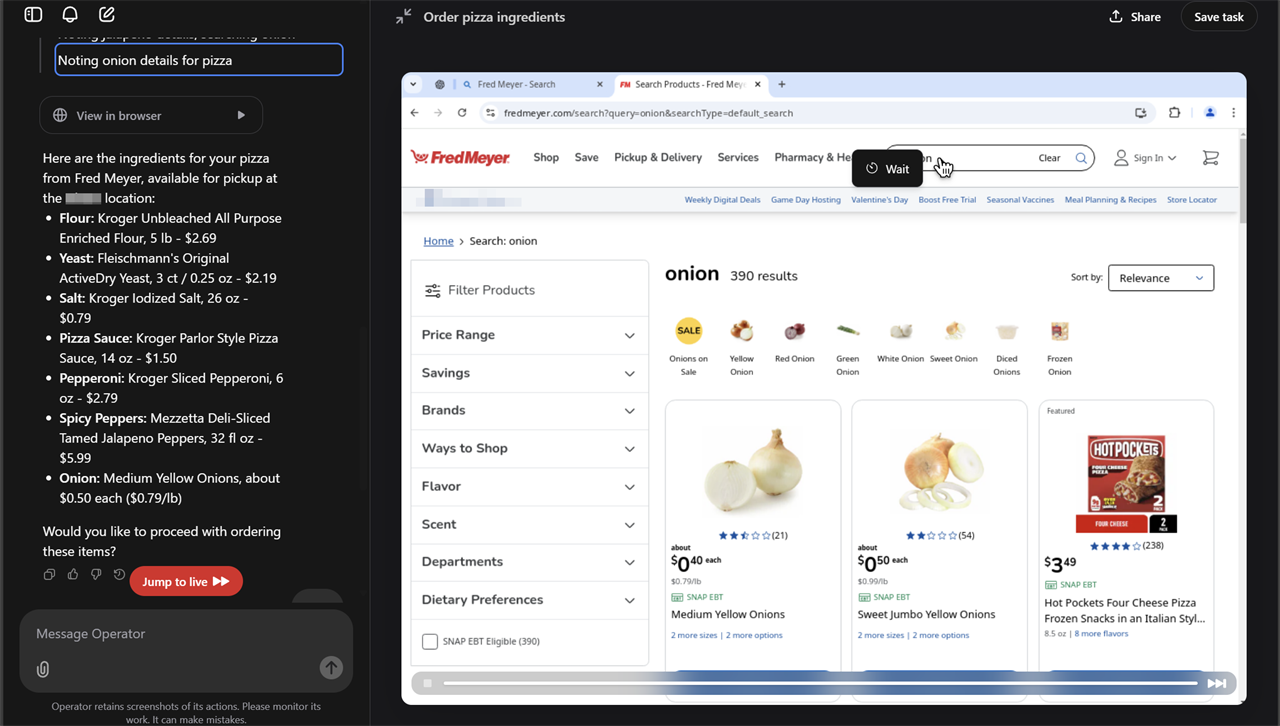How to Use an AI Agent
AI Agents like OpenAI's Operator want to do your busywork for you.How-To

AI companies are riding high on agentic AI hype. According to them, we’ll all soon have access to smart AI agents able to perform complex, multi-step tasks at our command.
OpenAI’s take on this idea, Operator, is available as a research preview for ChatGPT Pro subscribers. As promised, it can surf the web independently to accomplish tasks like online shopping.
But how well does it work, and will it save you time? Right now, the easiest to access AI agents are behind paywalls, so I paid up for a ChatGPT Pro subscription to find out.
Putting Operator to work
Once you have a Pro plan (which is $200 per month, by the way), you can access Operator by navigating to ChatGPT in your web browser and selecting Operator from the list in the upper left-hand corner.
That opens an entirely new browser window with a familiar ChatGPT interface, as well as a few auto-generated suggestions.
You can type anything you’d like into Operator’s prompt. In every case, Operator will respond by opening a browser window and surfing the web to fulfill your prompt.
Use case: Shopping
Which brings us to our first test: Shopping.
OpenAI highlights this in its own marketing for Operator. They say it can fulfill complex, multi-step tasks, so I challenged it with this prompt.
“I want to make pizza tonight. I like pepperoni, spicy peppers, and onions on my pizza. I want to pick up. please put the items in my cart and set up a pickup for 5pm tonight”
I’ve omitted the store and my zip code from the prompt; otherwise, this is the exact prompt I used.
Operator had a rocky start. The store I asked Operator to use requires a sign-in to even add items to the cart. I had to take over the Operator session and enter my login details manually. I understand why it’s required, but it’s a roadblock AI agents will need to get over.
 Screenshot: Matthew Smith
Screenshot: Matthew Smith
After that, Operator added pepperoni, pepperoncini, and a three-pound bag of onions, then headed to the checkout and asked me to finish up by paying for the order. Operator also located the correct store and set a pick-up for the correct time.
But I can’t make pizza with those ingredients, and Operator didn’t ask if I meant to make pizza from scratch or already had the rest of my ingredients.
So, I told Operator I wanted to make the pizza from scratch, and that I didn’t have any ingredients. It solved that by adding a pre-packaged pizza dough, sauce, and mozzarella to the order.
Agents want you to get specific
This points out a trait of AI agents that everyone needs to understand. They’ll follow instructions, for better or worse.
I’d imagined making a more up-scale pizza. I would make the dough myself and order a more expensive mozzarella, but I’m ok using a pre-packaged pizza sauce. I didn’t tell Operator any of that, so it met my request with a basic, inexpensive take on homemade pizza.
The solution? Be more specific.
 Screenshot: Matthew Smith
Screenshot: Matthew Smith
I opened a new Operator session and filled in the information I’d left out before. Now that it had more context, Operator was able to pick out items that correctly filled my request, including flour, salt, and yeast for the dough.
Use case: Finding and filling a boring form
An AI agent that orders groceries is useful, but there are already many ways to make shopping for groceries less time-consuming. So, let’s try something I doubt anyone would find enjoyable…talking to a utility company. To be specific: my recycling bin is broken, and it needs to be fixed.
"I need to have my recycle bin fixed. The lid is broken. Please get in touch with them and let me know I need my bin fixed or replaced."
Again, I’ve omitted some personal information the agent needs to complete the form, but this is otherwise the prompt I used.
Operator crushed this use case. It not only found the correct contact form used by my garbage collection utility, but it did so in under a minute.
The form did have a Captcha, though, so I had to complete that myself before the form could be submitted.
Bonus round: Making a meme
Ok, so Operator can handle boring, specific tasks. But can an agent come up with its own ideas? To find out, I gave it this prompt.
"Can you make me a meme that is a funny take on a person using Operator and being surprised by what it does?"
Here’s what Operator produced with Imgflip’s meme generator.

Screenshot: Matthew Smith
I’ll give Operator partial credit. It’s not very funny but, disregarding my own advice, I didn’t give it anything specific to work with. Even so, it created a meme that correctly represents a reaction some people will have when they use Operator. And I do find it a little funny that Operator generated a meme that’s giving itself a compliment.
Interestingly, the meme test also highlighted one of Operator’s security precautions.

Screenshot: Matthew Smith
Operator detected that the meme’s text includes words that look like they’re trying to tell it what to do.
Strange though it may seem, that’s a real security concern. A malicious website could in theory hijack an AI agent with specific text that changes its prompt. To hedge against that, Operator will flag text that might influence it.
Early days for AI agents
OpenAI’s Operator performed well in the tasks I threw at it but, as it currently exists, it has limitations. Operator can only tackle tasks that it can solve by browsing the web. That covers a pretty wide range of day-to-day activities, but it’s not going to help if you want Operator to navigate an app on your desktop. Operator also won't, for example, order liquor online for me.
Finally, Operator won’t attempt to overcome anti-bot restrictions, such as Captchas. That means you’ll need to manually take over Operator to finish many tasks, which is a big problem if you want Operator to automate an online workflow.
Operator alternatives
Despite the hype over AI agents, Operator doesn’t have a lot of competition right now.
The most obvious alternative is Anthropic’s Claude Computer Use, which is currently in beta. It’s only provided as an API, though, so it’s not easy to use. There’s also open source alternatives like Browser Use but, once again, they’re more difficult to use.
Operator’s usefulness is cannibalized by other ChatGPT features. ChatGPT’s web search won’t put the items in your cart, but it can search for deals and give you links to them. If you want to automate research or collect information found online, ChatGPT’s Deep Research will prove more comprehensive.
Automation is also hampered by Operator’s inability to beat bot checks or enter login details. There are obvious reasons for these restrictions, but they’re a big obstacle to widespread general AI agent use so far.
Operator partially handled the tasks I set out for it, and that did save me some time. Asking whether Operator is worth the high subscription price is a bit unfair, since it’s just one of several features that come with ChatGPT Pro. But for right now, AI agents remain more of a "coming soon" feature than something that's ready to use with everyday AI.
Read more: AI Tools and Tips
- DeepSeek's New AI Challenges ChatGPT — and You Can Run It on Your PC
- How To Improve Your AI Chatbot Prompts
- How I Turned Myself into an AI Video Clone for Under $50
- What is Meta AI? A Capable Chatbot That’s 100% Free
- Hands-on with ChatGPT o1-preview, OpenAI's Latest Innovation
- How to Get Started with Copilot for Microsoft 365
- Getting started with LM Studio: A Beginner's Guide
- Meet Claude, the Best AI You've Never Heard of
Matthew S. Smith is a prolific tech journalist, critic, product reviewer, and influencer from Portland, Oregon. Over 16 years covering tech he has reviewed thousands of PC laptops, desktops, monitors, and other consumer gadgets. Matthew also hosts Computer Gaming Yesterday, a YouTube channel dedicated to retro PC gaming, and covers the latest artificial intelligence research for IEEE Spectrum.












